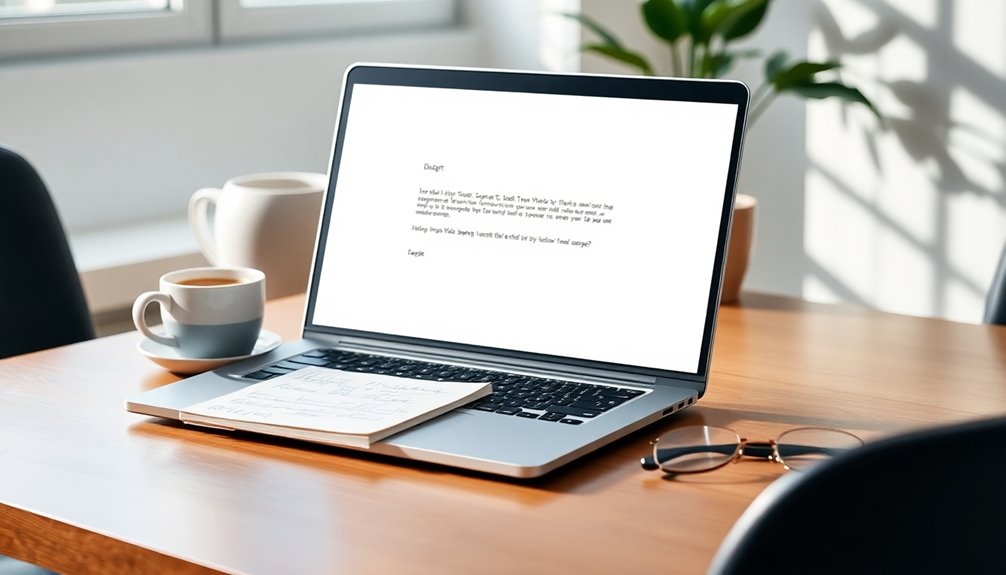To write a professional two weeks' notice email, start with a clear subject line indicating your resignation. Address your supervisor with a respectful greeting. State your intention to resign and specify your last working day. Keep the email concise and express gratitude for the opportunities and experiences you've had. Offer assistance during the transition to ensure a smooth handover. Throughout, maintain a courteous tone to foster goodwill. Pay attention to details and proofread before sending. By following these steps, you can leave a lasting positive impression and strengthen your professional relationships for the future. There's much more to share!
Key Takeaways
- Begin with a clear subject line that indicates your intention to resign and includes your last working day.
- Use a respectful and courteous tone, addressing your supervisor directly in the greeting.
- Express gratitude for the opportunities and experiences gained during your tenure at the company.
- Offer assistance during the transition period, including training a replacement if necessary.
- Confirm receipt of your resignation email with HR and discuss further exit procedures.
Introduction

When you decide to leave a job, writing a two-week notice email is an essential step in the process. This email serves as your formal resignation, demonstrating professionalism and respect for your employer.
It's crucial to clearly state your intention to resign and specify your last working day to avoid any ambiguity. A well-crafted resignation letter can set the tone for your departure and help ensure a smooth transition.
Expressing gratitude for the opportunities you've had during your employment fosters goodwill and can aid in maintaining positive relationships with your colleagues and supervisors. A positive tone in your email will reflect well on your professional reputation.
Additionally, you should offer assistance during the transition period, whether that means training your replacement or wrapping up projects. This gesture reinforces your commitment to a smooth handover and shows that you value the team you're leaving behind.
Maintains Professional Relationships

Maintaining professional relationships during your resignation is crucial for your future career. When you approach your two weeks' notice with professionalism and respect, you lay the groundwork to maintain positive relationships with colleagues and supervisors.
Start by expressing gratitude for the opportunities and experiences you've gained; this not only strengthens bonds but also fosters goodwill that can benefit future networking opportunities.
Clear communication about your departure is essential. Let your team know about your plans and your willingness to assist during the transition. This approach demonstrates respect for those you're leaving behind and contributes to a smoother handover process.
Leaving on good terms increases the likelihood of receiving strong references, which can be vital for career advancement in many fields.
Crafting a professional farewell message reinforces a positive lasting impression, enhancing your professional reputation. This could open doors for future collaborations or job opportunities.
Clear Subject Line Choice

Choosing a clear subject line is vital for ensuring your resignation email is noticed and understood. A well-crafted subject line conveys the purpose of your email immediately, and including "resignation" is crucial. This not only highlights the email's significance but also adds a sense of urgency. For example, a subject line like "Resignation Notice – [Your Name]" gets straight to the point.
Keep your subject line concise to maintain professionalism and facilitate easy identification in your recipient's inbox. Avoid vague terms or casual phrases; instead, use direct language that reflects the formal nature of your resignation. This shows respect and helps uphold professional courtesy.
Consider adding your last working day for added clarity, such as "Resignation Notice – [Your Name] – Last Day [Date]." This gives your manager immediate context and communicates your intention clearly.
Step-by-Step Email Writing Process

Writing a resignation email can feel daunting, but breaking it down into clear steps makes the process easier.
First, start with a clear subject line, like "Resignation – [Your Name]," so your supervisor immediately understands your intention to resign.
Next, open with a professional greeting, addressing your supervisor by name to set a respectful tone.
In the body of your two weeks notice email, clearly state your intention to resign and specify your last day of employment, ensuring you adhere to the two-week notice period.
This clarity helps your employer plan for your departure.
Express your gratitude for the opportunities you've had during your time with the company.
This not only shows appreciation but also helps maintain a positive relationship moving forward.
Dos and Don'ts for Resignation Emails

Crafting a resignation email requires attention to detail and a professional approach. Start by maintaining a professional tone throughout your message. Respectful language helps you avoid negative comments, which is crucial since 85% of employers prefer a formal notice.
Clearly state your last working day to eliminate any ambiguity—this helps your employer with planning.
When writing your email, express gratitude for the opportunities and experiences you've gained. Acknowledging your time at the company fosters goodwill and helps maintain positive relationships.
Keep your message concise; avoid excessive details about why you're leaving. Focus on your clear intention to resign without over-explaining.
Lastly, don't forget to proofread your email. Ensuring it's free of grammatical errors and typos reflects professionalism and your attention to detail.
A well-crafted resignation email not only communicates your departure but also leaves a lasting positive impression. By following these dos and don'ts, you can navigate your resignation process smoothly and respectfully.
Examples of Professional Resignation Emails

When you decide to resign, it's essential to communicate your decision clearly and professionally through your resignation email.
Start with a clear subject line like "Resignation – [Your Name]" to indicate your intent. Use a formal greeting to set the right tone. For example: "Dear [Manager’s Name]," then follow with a concise statement of your resignation. Specify your last day of work, typically two weeks from the date of the email.
Express your gratitude towards the employer by acknowledging the opportunities and experiences you've gained. A sentence like, "I appreciate the support and guidance I've received during my time here," can go a long way in maintaining professionalism.
Additionally, offer assistance to ensure a smooth transition. You might say, "I'm happy to help train my replacement or wrap up any ongoing projects." This not only shows respect for your employer but also reinforces positive relationships.
Remember to maintain a positive tone throughout the email. Avoid any negative comments about your experience.
Ending on a friendly note, such as "I wish the team continued success," can leave a lasting positive impression.
Pro Tips for Writing Effective Emails

Effective emails can make a significant difference in communication, especially in professional settings. When you're writing your two weeks notice, start with a clear subject line like "Resignation – [Your Name]." This ensures your email is easily identifiable and sets the right tone from the get-go.
Keep your email concise and focused, ideally within 3-4 short paragraphs. Clearly state your intention to resign and mention your final working day.
It's crucial to maintain professionalism throughout, so express gratitude for the opportunities and experiences you've gained during your time with the company.
Offer assistance during the transition period, such as training a replacement or completing outstanding tasks. This demonstrates your commitment to a smooth handover, which reflects well on you. Remember, your last impression counts too.
Before hitting send, proofread your email to catch any grammatical errors or typos. Attention to detail showcases your professionalism and respect for the recipient.
Final Thoughts

Resignation can be a daunting process, but approaching it with professionalism and grace can make a significant difference in how you're remembered. By providing two weeks notice, you're signaling your clear intention to resign while giving your employer time to prepare for your departure. This act of professionalism and respect fosters positive relationships that can benefit your future career.
In your email, express gratitude for the opportunities and experiences you've had. This helps maintain professionalism and leaves a lasting, positive impression on your colleagues and employer. Highlighting your final working day and keeping your message concise and focused on the positive aspects of your time there's essential.
Don't forget to include an offer of assistance during this transition period. This gesture not only shows your commitment to a smooth transition but also reinforces your professionalism.
Frequently Asked Questions
Is It Professional to Email 2 Weeks Notice?
Yes, it's professional to email your two-week notice, especially in today's digital age.
Many industries accept and even prefer email for clear documentation. By emailing your resignation, you ensure that it's communicated promptly and can be easily referenced.
Just remember, it's a good idea to discuss your decision in person first, if possible. This approach shows respect for your employer and helps maintain a positive relationship as you transition.
How to Professionally Turn in a 2 Week Notice?
When you're ready to turn in your two weeks' notice, start by scheduling a face-to-face meeting with your supervisor.
Clearly express your intention to resign and mention your last working day.
After that conversation, follow up with a formal email that thanks them for the opportunities you've had.
Offer to help during the transition, and maintain a professional tone throughout.
This approach shows respect and keeps your relationship positive.
How Do You Politely Resign in an Email?
To politely resign in an email, start with a clear subject line like "Resignation – [Your Name]."
State your intention to leave and mention your last working day, keeping it professional.
Express gratitude for the opportunities you've had, which enhances the positive tone.
Offer help during the transition, like training a replacement.
End with a professional closing, reinforcing your appreciation and your desire to keep a good relationship moving forward.
What Happens if You Give Two Weeks Notice and They Ask You to Leave?
If you give two weeks' notice and they ask you to leave immediately, it's usually within their rights to do so.
Many companies prefer this to avoid disruptions. You might still get paid for those two weeks, but it varies by policy.
Stay professional during this time, as your attitude can impact future references.
Make sure to document your work and communicate any pending tasks to help ease the transition for your team.









